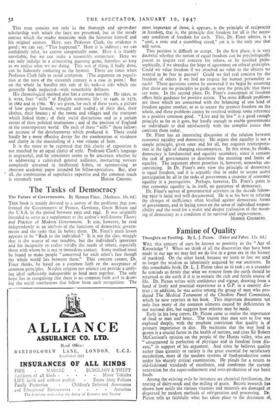The Tasks of Democracy
The Future of Governments. By Herman Finer. (Methuen. 10s. 6d.) Tins book is mainly devoted to a survey of the problems that con- fronted the Governments of France, Germany, Great Britain and the U.S.A. in the period between 1932 and 1942. It was originally intended to serve as a supplement to the author's well-known Theory and Practice of Modern Government. It can, however, be read independently as an analysis of the functions of democratic govern- ments and the tasks that lie before them. Dr. Finer's main lesson appears to be "Back to the individual." It is not the class struggle that is the source of our troubles, but the individual's ignorance and his incapacity to realise vividly the needs of others, especially those with whom he is not in immediate contact. Some method must be found to make people "concerned for each other's fate though the whole world lies between them." This concern cannot, Dr. Finer thinks, be based on a common faith or the acceptance of common principles. Neither religion nor science can provide a unify- ing ideal sufficiently indisputable to bind men together. The only hope lies in recognising that there is no common faith and in draw- ing the social conclusions that follow from such recognition. The most important of these, it appears, is the principle of reciprocity in freedom, that is, the principle that freedom for all is the neces- sary condition of freedom for each. This, Dr. Finer admits, is a " cool, a stoic and a stumbling creed," yet it is the only one that will serve.
This position is difficult to accept. In the first place, it is very doubtful whether the notion of equal freedom can be psychologically potent to inspire real concern for others, or be justified philo- sophically, if we abandon the hope of agreement on ethical principles. Could we value freedom if we attached no value to the objects we wanted to be free to pursue? Could we feel real concern for the freedom of others if we had no respect for human personality as such? These questions cannot be answered if we begin by assuming that there are no principles to guide us save the principle that there are none. In the second place, Dr. Finer's conception of freedom offers little guidance for positive action. The most difficult problems are those which are concerned with the balancing of one kind of freedom against another, so as to secure the greatest freedom on the whole, and these problems cannot be resolved without some reference to a positive common good. "Live and let live " is a good enough principle so far as it goes, but hardly enough to enable governments or individuals to deal satisfactorily with the complex issues that confront them today.
Dr. Finer has an interesting discussion of the relation between economic equality and democracy. He argues that equality is not a simple principle, given once and for all, but requires reinterpreta- tion in the light of changing circumstances. In this sense, he thinks, democracy is fundamental and equality secondary, since it remains the task of governments to determine the meaning and limits of equality. The argument about priorities is, however, somewhat un- convincing. In Dr. Finer's own view the principle of democracy is equal freedom, and it is arguable that in order to secure active participation by all in the tasks of government a measure of economic equality is a prerequisite. Perhaps, however, Dr. Finer's point is that economic equality is, in itself, no guarantee of democracy.
Dr. Finer's survey of governmental activities in the decade follow- ing 1932 is lucid and well documented. He is at his best in refuting the charges of inefficiency often levelled against democratic forms . of government, and in laying stress on the sense of individual respon- sibility and the need for a wider and deeper realisation of the mean- ing of democracy as a condition of its survival and improvement.
MORRIS GINSBERG.


































 Previous page
Previous page